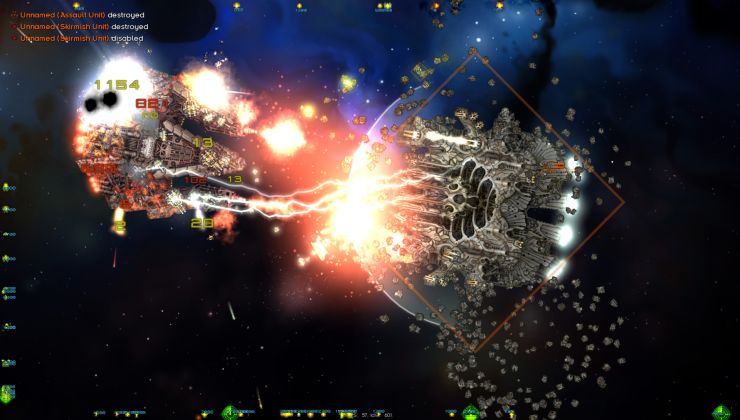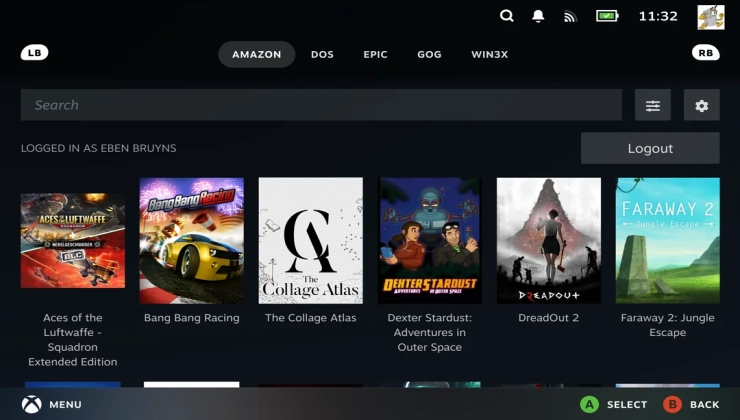It seems at some point over the last month or two, GOG finally removed the "in progress" notice for GOG Galaxy coming to Linux.
Something that was a bit overdue, since they clearly have no plans to actually bring GOG Galaxy to Linux despite it being the most voted-for feature request for many years. GOG and CD Projekt never really took it seriously though, with even the official Cyberpunk 2077 Twitter account trolling "We can assure you: it‘s not us. We are the driving force behind 'add Linux support for GOG Galaxy' though" in reply to GOG post about showing 2077 gameplay.
Every time I've spoken to the GOG team over the last few years, they just repeatedly told me it wasn't planned, despite the wishlist entry still listing it as "in progress" and their original announcement mentioning it would come to Linux too and that it was "being done with PC, Mac and Linux in mind" (so much for that huh?).
At least there's applications like the Heroic Games Launcher and Lutris that can help you manage your GOG games on Linux. Still, it would be nice if GOG at some point put some more resources into improving their Linux support. Plus, if you're going to be using a Steam Deck, buying from Steam just makes a lot more sense when it's far easier to access so I imagine that's eventually going to cost GOG a few more sales too and they're not exactly doing well.
It is a shame for those that want the Galaxy client, as I actually love what GOG do. The main idea that you can just log in and download a full offline installer is great and their repeated revivals of old games is wonderful too. But without Galaxy, some games end up missing features for Linux or just skipping a Linux build entirely on GOG.
A) There is a slight difference between restructuring and open-sourcing an already existing code base, and developing something as open source from the ground up
I'm no dev, and maybe I'm fundamentally not understanding the purpose of OSI and similar licenses, but I thought if you take an existing OSI licensed code base, added/changed/modified it, that your finished product would still need to be Open Source, right?
Yeah, Valve could have written some closed source code for proton, but given the number of open source projects they rely on, how much could the realistically make closed? The installer script maybe?
Python though isn't a good idea for APU use case. I wish they'd used some compiled language for better performance.
If good or bad depends of your application in the end. I really doubt that handling controllers setup is a CPU intensive operation plus you can use Python C API if you need some speed up for certain components. The only con I see on that project is that they are using Python 2, to which the support ended in 2019.
Last edited by x_wing on 3 Jul 2022 at 3:37 am UTC
If good or bad depends of your application in the end. I really doubt that handling controllers setup is a CPU intensive operation plus you can use Python C API if you need some speed up for certain components. The only con I see on that project is that they are using Python 2, to which the support ended in 2019.
I suppose depends on how constantly it's used. If it's running all the time - it can be more CPU / RAM taxing than using something that doesn't require a beefy runtime.
On a normal CPU set up that might be of minimal concern, but on an APU resources are more expensive.
In general, I'd never recommend using Python for hardware support. Rust is a better idea.
Last edited by Shmerl on 3 Jul 2022 at 3:39 am UTC
If good or bad depends of your application in the end. I really doubt that handling controllers setup is a CPU intensive operation plus you can use Python C API if you need some speed up for certain components. The only con I see on that project is that they are using Python 2, to which the support ended in 2019.
I suppose depends on how constantly it's used. If it's running all the time - it can be more CPU / RAM taxing than using something that doesn't require a beefy runtime.
On a normal CPU set up that might be of minimal concern, but on an APU resources are more expensive.
In general, I'd never recommend using Python for hardware support. Rust is a better idea.
Well, controllers should be handled in an async way. If this program requires a lot of CPU, I would start doubting of the quality of the code. Either way, you must run some benchs in order to be 100% sure. Rewriting because it may be better is definitely gambling and, probably, a waste of time.
Last edited by x_wing on 3 Jul 2022 at 3:46 am UTC
I'm no dev, and maybe I'm fundamentally not understanding the purpose of OSI and similar licenses, but I thought if you take an existing OSI licensed code base, added/changed/modified it, that your finished product would still need to be Open Source, right?Nope. There are plenty of [OSI-approved licences](https://opensource.org/licenses) that aren't copyleft.
Another case of someone completely missing the point of what I wrote, and in this case, trying to put words into my mouth (or into my text area, as it were).
Well shit, I'm done. Can't contribute to a discussion without that happening. Too many people are far too eager to go nuts at me instead I guess. I mean, how dare I have what's viewed as an opposing opinion (whether it even is or not).
I'm sad to see you go, Mirv. That last sentence is a bit ironic though, eh? I have an opposed opinion to you, how dare I?
I always enjoyed what you brought to the table - a developer's view of Linux gaming, but still with a gamer's perspective. I'll miss your chat, although I stand by what I said about Microsoft.
@Mirv, I’m also sad to see you’ve left. I didn’t had the impression that I moved out of line. If I stepped on a wrong foot of yours, I apologize, that certainly wasn’t my intention. I hope you’ll reconsider leaving this site, wise old men (
Last edited by jens on 3 Jul 2022 at 1:13 pm UTC
It's tricky and costly for me. IF the game is one I'll play on the Steam Deck then I obviously buy it on Steam...it's just too easy, but then I tend to add the game to my wishlist at GoG and when the price is low enough I plan to buy it on GoG to create an offline back for future game preservation playing. If it's a game I will only ever play on my PC, then I snag it on GoG only.There is no need to rebuy a game on GOG just to have an offline backup. For Steam games, you can also make a backup of your "common" folder (and maybe "compatdata" for non native games), and you're good to go.
Being able to have an offline backup of a game (even if only Windows), is very important to me...I am also enjoying my old NES games now thanks to owning the physical game and getting an Analogue NT Mini a while back, and it got me think about what if I want to play a game (backlog or replay) in 10, 20, 30 years....will Steam be around?
P.S. Yes, I have an older computer and my current computer that I plan to keep alive and drivers back up offline for future needs.
First of all we are talking about companies, the only other place I see emotions get so high is when there is any article about apple on tweakers.net.
Gog, valve, they exist to make money, valve decided they do that their way with millionsthey have so they can keep making money even if Microsoft creates the walled garden, gog feels the overhead is not worth it or they simply do not have it, and for now focus on the big market.
Use them for what they are good at, old school games ready for scummvm or dosbox etc, go gog, you get them, drm free, download them and your done, there won't be a gazillion patches for which you need an automated client. New stuff enjoy steam, and it's great all there efforts help linux gaming and wine.
Just remember they are companies :)
I'm no dev, and maybe I'm fundamentally not understanding the purpose of OSI and similar licenses, but I thought if you take an existing OSI licensed code base, added/changed/modified it, that your finished product would still need to be Open Source, right?Nope. There are plenty of [OSI-approved licences](https://opensource.org/licenses) that aren't copyleft.
A) There is a slight difference between restructuring and open-sourcing an already existing code base, and developing something as open source from the ground up
I'm no dev, and maybe I'm fundamentally not understanding the purpose of OSI and similar licenses, but I thought if you take an existing OSI licensed code base, added/changed/modified it, that your finished product would still need to be Open Source, right?
Yeah, Valve could have written some closed source code for proton, but given the number of open source projects they rely on, how much could the realistically make closed? The installer script maybe?
I think the FSF has a good page explaining free software (and another how "open source" is not equivalent): [FSF page](https://www.gnu.org/philosophy/free-sw.html.en)
Thanks! I knew you could write proprietary code and have it "talk to" OSI stuff, I didn't know you could take some OSI stuff and make it proprietary. I guess a good example would be the proprietary tech porting houses use ( which is probably based on WINE), right?
It's tricky and costly for me. IF the game is one I'll play on the Steam Deck then I obviously buy it on Steam...it's just too easy, but then I tend to add the game to my wishlist at GoG and when the price is low enough I plan to buy it on GoG to create an offline back for future game preservation playing. If it's a game I will only ever play on my PC, then I snag it on GoG only.There is no need to rebuy a game on GOG just to have an offline backup. For Steam games, you can also make a backup of your "common" folder (and maybe "compatdata" for non native games), and you're good to go.
Being able to have an offline backup of a game (even if only Windows), is very important to me...I am also enjoying my old NES games now thanks to owning the physical game and getting an Analogue NT Mini a while back, and it got me think about what if I want to play a game (backlog or replay) in 10, 20, 30 years....will Steam be around?
P.S. Yes, I have an older computer and my current computer that I plan to keep alive and drivers back up offline for future needs.
I can't speak for everyone, but I believe the general thought here is when Valve and Steam are gone. If the game doesn't require Stan to run (DRM free), you would be ok, but otherwise, those games are lost.
Not presuming anyone's age here, but a lot of us probably remember the "store wars" 10-15 years ago. When those stores closed, you lost your games.
That was a BIG selling point for GOG at it's inception. Some people really hated the mandatory client/DRM thing Steam and others did.
A) There is a slight difference between restructuring and open-sourcing an already existing code base, and developing something as open source from the ground up
I'm no dev, and maybe I'm fundamentally not understanding the purpose of OSI and similar licenses, but I thought if you take an existing OSI licensed code base, added/changed/modified it, that your finished product would still need to be Open Source, right?
Yeah, Valve could have written some closed source code for proton, but given the number of open source projects they rely on, how much could the realistically make closed? The installer script maybe?
Purple Library Guy already summed it up quite nicely:
It needs Wine to work, but Proton itself is a separate thing, and Wine is LGPL not GPL, so there's nothing to stop someone from attaching Wine to a closed module. Sooo, yes, they could have kept Proton closed.(they could have made Proton completely closed, but decided to go 100% Open Source!).It's based on wine. So no, they could not have kept it closed. So please don't make an essential requirement look like they did a great thing.
One example of how they could have gone about it is Easy Cheat: before the Steam Deck was released, there was wide speculation that in order to make Easy Cheat work Valve would strike a deal with Epic and make it work only on the Steam Deck by developing a closed source, proprietary kernel module that would satisfy Easy Cheat's requirements for system immutability etc. Yet, they did it completely transparently and in a way that anyone on a Linux distro can benefit from their behind-the-scenes work. Same with Battleye.
Still, even if this weren't the case and Proton was a de facto open source app, it remains the case that restructuring a code base of some 20+ years of spaghetti legacy in order to open-source it would be a hell of a headache for Valve's devs with minimal gain for Valve, if at all.
Last edited by Nocifer on 4 Jul 2022 at 8:28 am UTC
I think the FSF has a good page explaining free software (and another how "open source" is not equivalent): [FSF page](https://www.gnu.org/philosophy/free-sw.html.en)
It isn't a very good explanation -- very long winded. To shorten it: basically "free" software means 1) you can run it how and why you want, 2) study and change it how you want, 3) distribute copies how you want, and 4) distribute modified copies how you want.
With "open source" software, the only real requirement is that the source be publicly available. The open source developer might choose a "free" license, or a "proprietary" license, or something in-between (like a no-paid commercial sales license).
<snip>That was a BIG selling point for GOG at it's inception. Some people really hated the mandatory client/DRM thing Steam and others did.
This was me -- I hated the DRM. But over time (and not even a lot of time) even the Windows installs for GOG games had issues. I'm a software developer -- if I want to debug software or software installs, I get paid pretty nicely to do that. When I want to play games, I want to relax and not debug software.
It always seemed over half the games wouldn't run on Windows without hours of tweaking -- and Linux stuff was only supported for one particular ancient-beyond-belief version of a distribution. It seemed very old-school, as in physical media old school -- one release that (might) work for a particular version of a particular OS, and that's it -- done.
Steam might use DRM, but at least their games just-work for me. (YMMV -- I don't have hundreds of Steam games.) The worst I've had to do is change which version of Proton a game uses. No debugging library incompatibilities or video card drivers or finding some silly setting in a config file in a hidden directory. And that's on Manjaro, which isn't exactly number one on the supported distributions list. (Had similar easy experiences with Mint and MX.)
Steam might use DRM, but at least their games just-work for me. (YMMV -- I don't have hundreds of Steam games.)
I do have hundreds of Steam games (thanks Humble Bundle and Steam sales!) and the vast majority of them just run when I click "Play", and of them few that don't, more and more of them seem to fall into line and start being cooperative each time I go back to test them again.
That is indeed shorter, but it's not accurate. I'm more of a "free software" guy than an "open source" guy, but even I admit that the Open Source Definition is a lot more stringent than that.I think the FSF has a good page explaining free software (and another how "open source" is not equivalent): [FSF page](https://www.gnu.org/philosophy/free-sw.html.en)
It isn't a very good explanation -- very long winded. To shorten it: basically "free" software means 1) you can run it how and why you want, 2) study and change it how you want, 3) distribute copies how you want, and 4) distribute modified copies how you want.
With "open source" software, the only real requirement is that the source be publicly available. The open source developer might choose a "free" license, or a "proprietary" license, or something in-between (like a no-paid commercial sales license).
All its gyrations and spinning wheels on startup, culminates in an absolutely sickening, bloated, fragile, chrome browser-based UI.
I'm not sure having the source code to the client would help you :-)
Steam is really an awful program on Linux. It should get a complete rewrite instead of the cobbled together kludge that it is.
All its gyrations and spinning wheels on startup, culminates in an absolutely sickening, bloated, fragile, chrome browser-based UI.
I'm not sure having the source code to the client would help you :-)
I don't think anyone could argue that it's not "cobbled together kludge", but I don't see what you mean by "bloated" or "fragile". I can't think of many features it offers that I don't use (pretty much the reason I'm a Steam-focused gamer), and it's never crashed on me in coming up 9 years of every day gaming, so I'm not seeing "fragile" at all.
Steam is really an awful program on Linux. It should get a complete rewrite instead of the cobbled together kludge that it is.
All its gyrations and spinning wheels on startup, culminates in an absolutely sickening, bloated, fragile, chrome browser-based UI.
I'm not sure having the source code to the client would help you :-)
I don't think anyone could argue that it's not "cobbled together kludge", but I don't see what you mean by "bloated" or "fragile". I can't think of many features it offers that I don't use (pretty much the reason I'm a Steam-focused gamer), and it's never crashed on me in coming up 9 years of every day gaming, so I'm not seeing "fragile" at all.
I've personally had the occasional issue or glitch with Steam over the years, but they are at least becoming increasingly rare these days, so at least they're clearly working on it (however slowly "Valve Time™" continues to run).
It's also fragile in that it gets broken due to library changes. Steam bundles libraries that have to interface with your system. APIs change, Chrome UI breaks.
Yes, I have had it happen. A recent example was harfbuzz/freetype and it broke the user interface.
Sorry, but that Chrome UI is bloated rubbish. I can't stand it. You think that's light weight?
It's also fragile in that it gets broken due to library changes. Steam bundles libraries that have to interface with your system. APIs change, Chrome UI breaks.
Yes, I have had it happen. A recent example was harfbuzz/freetype and it broke the user interface.
Bloated how? Rubbish how? No, it's definitely not lightweight - not sure that comment was aimed at me, but I never said it was lightweight. Indeed, I agreed it's a kludgey interface. It's a long-way from a perfect user experience, for sure.
As for library changes breaking, I'd suggest changing distro - I also had lots of weird stuff on Manjaro, to the point it barely lasted a fortnight on my PC before I moved on.











 How to set, change and reset your SteamOS / Steam Deck desktop sudo password
How to set, change and reset your SteamOS / Steam Deck desktop sudo password How to set up Decky Loader on Steam Deck / SteamOS for easy plugins
How to set up Decky Loader on Steam Deck / SteamOS for easy plugins
See more from me